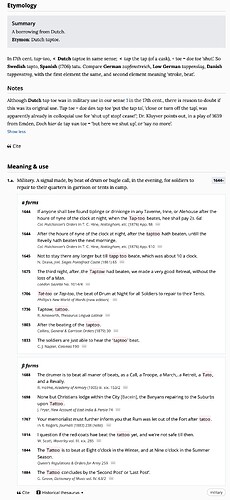Not the inked skin one, but the drum playing one.
The entry says this sense is transferred (ultimately anyway) from Dutch tap toe, but doesn’t say why that would be related to a drum. My guess is that the missing link is something like “a signal (military?) that it’s time to shut the taps, or more generally to shut things down for the night”, and that the bugle call known as “taps” is also related – but I don’t know.
According to the OED, tap toe (literally meaning “shut the tap”) had the idiomatic sense of “shut up” or “stop doing what you’re doing”. Hence, it came to denote the signal used to tell soldiers that it was time to bed down for the night. Armies originally used drums for this, and so the word later came to denote drumbeats in general.
This sounds like general confirmation of most of what I said – but is there proof that we’re right?
I guess what I mean is, is your “hence” section right there in the OED, or is the “hence” a signal that this is your own conclusion?
The OED seems to imply that the Dutch idiom lies behind the military usage of the term. It may be significant, however, that the earliest English quotation relates to “tiplinge or drinkinge” – perhaps the army originally used the phrase in its literal sense, to tell the men that it was time to shut the beer taps off and return to quarters.
1 Like
